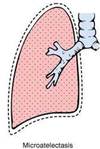Pathology 1 Flashcards
Define Atelectasis
- incomplete expansion of lungs (neonatal) or collapse of previously inflated lung substances
–> usually reversible
–> hypoxia
–> predisposes to infection
describe resorption atelectasis
1) Resorption = follows complete airway obstruction; excessive secretions; mediastinal shift toward atelectatic lung

describe compression atelectasis
- excessive air, fluid, blood, or tumor in pleural space; mediastinum shifts away from affected lung

patchy atelectasis
- loss of surfactant; RDS; postsurgical

describe contraction atelectasis
- fibrosis around the lung (cicatrization)

describe Hemodynamic pulmonary edema
- caused by INCREASE HYDROSTATIC PRESSURE, such as left-sided CHF
- GROSS: heavy, wet lungs; initially, basilar accumulation
- MICRO: engorgement of alveolar capillaries; intraalveolar pink precipitate; alveolar micro-hemorrhages; hemosiderin-laden macrophages (heart failrue cells)
Describe edema caused by microvascular injury
- Mech: injury to capillaries of alveolar septa
- Primary injur to vascular endothelium or damage to alveolar epithelial cells
- leakage of fluid and proteins
** can be localized (pneumonia) or diffuse (ARDS) **
Emphysema
Obstructive
- ANATOMIC SITE = ACINUS
- PATH = airspace enlargement; wall destruction
- Etiology = tobacco smoking,
- Symptoms = Dyspnea
chronic bronchitis
Obstructive
- ANATOMIC SITE = Bronchus
- PATH = mucus gland hyperplasia, hypersecretion
- Etiology = tobacco smoke, air pollutants
- Symptoms = cough, sputum production
bronchiectasis
Obstructive
- ANATOMIC SITE = Bronchus
- PATH = Airway dialtion and scarring
- Etiology = persistent or severe infections
- Symptoms = cough; purulent sputum; fever
Asthma
Obstructive
- ANATOMIC SITE = Bronchus
- PATH = Smooth muscle hyperplasia, excess mucus, inflammation
- Etiology = immunologic or undefined causes
- Symptoms = EPISODIC, wheezing, cough, dyspnea
Small airway disease, bronchiolitis
Obstructive
- ANATOMIC SITE = BRONCHIOLE
- PATH = inflammatory scarring/ obliteration
- Etiology = tobacco smoke, air pollutants, miscellaneous
- Symptoms = Cough, dyspnea
OBSTRUCTIVE VS RESTRICTIVE LUNG DISEASE
Obstructive:
–> limitation of airflow due to INCREASED resistance caused by partial or complete obstruction (trachea to respiratory bronchioles
–> DECREASE FEV1/FVC (due to decrease in FEV1)
RESTRICTIVE:
–> decreased expansion of lung with TLC
–> FEV1/FVC = NORMAL


